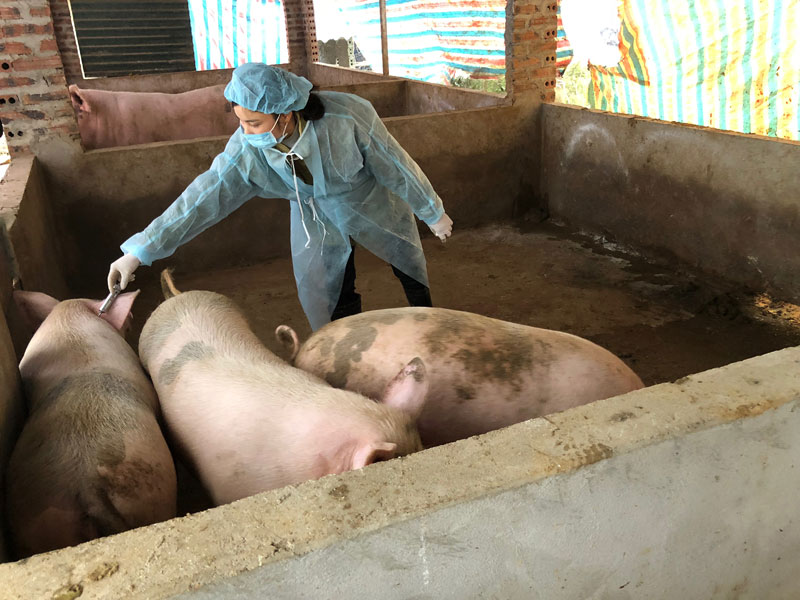
HBO – Hoa Binh province is doing its utmost to eliminate foot-and-mouth disease (FMD) on livestock. To date, the FMD epidemic has been going on for more than 1 month, appearing in seven out of 11 localities in the province including: Hoa Binh city, Luong Son, Kim Boi, Tan Lac, Lac Thuy, Lac Son and Yen Thuy districts. Disease outbreaks have great impacts on livestock production, food safety and public health in the province.

Veterinarians in Lien Vu commune (Lac
Son district) give shots of FMD vaccine to pigs in Chay village.
According
to a report of the local agriculture and rural development sector, besides the
4 localities that have yet to detect the disease, namely Ky Son, Cao Phong, Da
Bac and Mai Chau, there are three localities, namely Luong Son, Kim Boi and Hoa
Binh city, detecting no new outbreaks after 21 days. New outbreaks are reported
in four localities (Tan Lac, Yen Thuy, Lac Thuy and Lac Son) affecting nearly
3,000 pigs, of which 634 died. According to the animal husbandry and veterinary
medicine section, the main cause of FMD outbreaks in the localities is that
local farmers have not had their pigs vaccinated for a long time. The FMD
vaccination has only been carried out on cows and buffaloes through FMD control
programs on big cattle.
Another
reason is the mechanism of spreading outbreaks. FMD is classified into the
first group of diseases in the international quarantine list, as it causes a
high mortality rate in piglets, heifers and calves. For mature animals, they
can recover after about 2 weeks if being treated well, but the rapid spread of
the disease causes huge economic losses.
The
agriculture and rural development sector is working with localities where the
disease occurs to implement urgent measures to stop the disease, and prevent it
from spreading widely. Seven affected districts and city have allocated 2.1
billion VND from their standby budgets to buy 101,300 doses of vaccine for
epidemic prevention. The animal husbandry and veterinary medicine section regularly
checks and urges the implementation of measures to localise and stamp out FMD
outbreaks, while providing instructions along with tools and human resources to
affected areas to implement anti-epidemic works effectively.
Vuong
Dac Hung, Deputy Director of the provincial Department of Agriculture and Rural
Development, said that the province aims to stamp out all FMD outbreaks and
eliminate the disease by January 25.
With just over a month left until the school summer break, students are eagerly anticipating a period of rest and fun after a year of academic pressure. To provide a healthy environment for the physical development, in addition to the classes that foster talents and enhance the academic knowledge, sports and physical activities continue to attract a large number of children and teenagers.
On April 17th, Hoa Binh Provincial Museum organized a program to promote and introduce the outstanding values of "Hoa Binh Culture” at the Boarding Secondary and High School for ethnic minority students in Mai Chau District.
The Hoa Binh College of Technical Technology, in collaboration with the Hoa Binh Technical and Economic College and the provincial Association of Literature and Arts, hosted a gathering on April 15 to celebrate Laos’ traditional Bunpimay (New Year) Festival 2025 and debut the new book "Nguoi Muong o ban Don” (Muong people in Don village).
In the millennia-long history of national construction and safeguarding, people of all ethnic groups in Hoa Binh have been united and closely bound together to overcome all difficulties and challenges, standing alongside the entire Vietnamese people throughout the history of building and defending the country.
Living green is a healthy, positive, and sustainable lifestyle that not only helps protect
the environment and quality of life but also conserves natural resources and ecosystems.
Among the many ways to embrace this lifestyle, reducing plastic consumption is one of the most impactful.
The women's unions at all levels in Kim Boi district have been making significant contributions to the movement of building cultural life in the local community.
The movement helps improve rural look and the spiritual and material lives of local residents.



